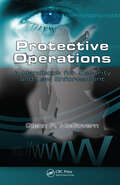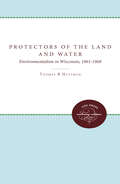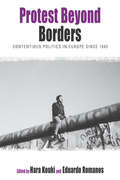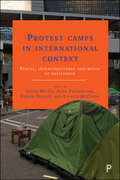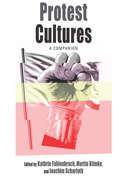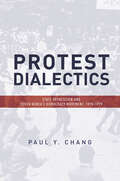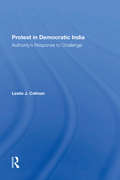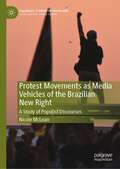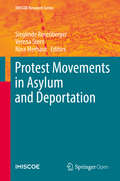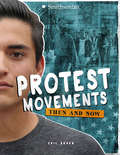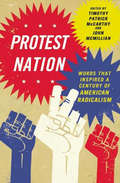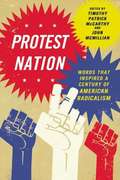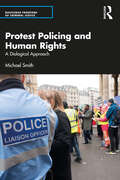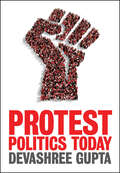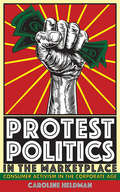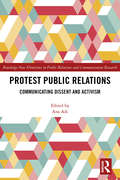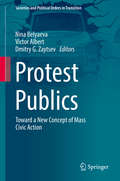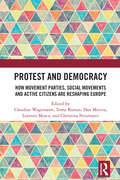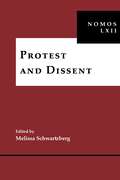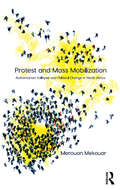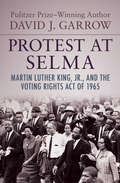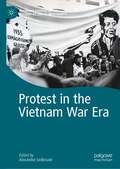- Table View
- List View
Protection, Control, And Accounting Of Nuclear Materials: International Challenges And National Programs
by National Research Council of the National AcademiesThe U.S. and Russian academies convened a workshop in 2003 for sharing best practices in nuclear materials protection, control, and accounting (MPC&A), including the status and application of remote monitoring technologies, personnel issues, and both national and international safeguards worldwide. The goals of the workshop were to identify areas in which the United States and Russia can promote best practices in MPC&A globally and expand U.S.-Russian cooperation on nuclear non-proliferation. The papers presented in the workshop and the outcomes of workshop discussions form the basis for this workshop summary.
Protective Operations: A Handbook for Security and Law Enforcement
by Glenn McGovernA reference for law enforcement and security organizations tasked with protecting the welfare of an individual or groups of individuals, this volume offers suggestions and guidance for confronting high-threat scenarios as well as the more mundane protective details. Detailing the essence of protective operations that are run, in large part, covertly, the book explores operational security, situational awareness, and surveillance detection and includes examples from real-world attacks occurring over the past sixty years. Focusing on the economics of providing the most protection for the least cost, it also addresses issues surrounding possible direct violations of the law and department policy and procedures.
Protector of the Small
by Tamora PierceNOTE: This series is a sequel to two earlier series by Tamora Pierce: Song of the Lioness and The Immortals. It is not necessary, however, to read the first two series to enjoy these books. They said a girl could NEVER be a knight... PROTECTOR OF THE SMALL First Test Page Squire Lady Knight. Ten long years have come and gone since the Kingdom of Tortall proclaimed that girls could take on a page's training. At long last, one young girl has come forward: Keladry of Mindelan. Kel and her family spent several years in the Yamani Islands, where she received warrior training in the arts of self-control and weaponry. Her aptitude seems clear, but the training master, Lord Wyldon of Cavall, fears that women are too weak to serve. Since her parents are highly regarded by the court, Lord Wyldon gives in, but on one condition: Kel must serve a one-year probation. Kel is furious, but she feels compelled to accept. She longs to become a knight like her heroine, Alanna the Lioness, the King's Champion. Drawing on her Yamani training, Kel braces herself against the hazing of her classmates, who believe that no girl is good enough to serve side by side with a boy. But this girl is determined to succeed. Kel refuses to let anyone or anything-including fearsome Immortal monsters such as the Spidren, Tauros or Hurroks-prey on the weak or the small. And this determination will stand her in good stead, as she readies herself for a future that includes an evil sorcerer who is the greatest monster of all....
Protectors of the Land and Water: Environmentalism in Wisconsin, 1961-1968
by Thomas R. HuffmanSince the beginning of the twentieth century, Wisconsin citizens have promoted innovative environmental programs. During the 1960s Wisconsin was again at the forefront of the movement advancing mainstream political environmentalism. Thomas Huffman traces the rise of environmentalism in the Badger State during these key years, when the people of Wisconsin instituted policies in such areas as outdoor recreation and resource planning, water pollution control, the preservation of wild rivers, and centralized environmental management. Huffman focuses especially on the influence of Senator Gaylord Nelson, a Democrat and founder of Earth Day, and Governor Warren Knowles, a Republican. He shows that their efforts--and the efforts of their followers in citizen groups, the business and university communities, and the state government--clearly indicate that the origins of environmentalism cannot be placed along a left-right political spectrum. Rather, the movement evolved from an interweaving of liberal and conservative ideologies and from important traditions and precedents within the state's environmental culture. What happened in Wisconsin is particularly significant, Huffman points out, because of the effect of that state's example on other states and the federal government.Originally published in 1994. A UNC Press Enduring Edition -- UNC Press Enduring Editions use the latest in digital technology to make available again books from our distinguished backlist that were previously out of print. These editions are published unaltered from the original, and are presented in affordable paperback formats, bringing readers both historical and cultural value.
Protest Beyond Borders: Contentious Politics in Europe since 1945 (Protest, Culture & Society #5)
by Hara Kouki Eduardo RomanosThe protest movements that followed the Second World War have recently become the object of study for various disciplines; however, the exchange of ideas between research fields, and comparative research in general, is lacking. An international and interdisciplinary dialogue is vital to not only describe the similarities and differences between the single national movements but also to evaluate how they contributed to the formation and evolution of a transnational civil society in Europe. This volume undertakes this challenge as well as questions some major assumptions of post-1945 protest and social mobilization both in Western and Eastern Europe. Historians, political scientists, sociologists and media studies scholars come together and offer insights into social movement research beyond conventional repertoires of protest and strictly defined periods, borders and paradigms, offering new perspectives on past and present processes of social change of the contemporary world.
Protest Camps in International Context: Spaces, Infrastructures and Media of Resistance
by Gavin Brown, Anna Feigenbaum, Fabian Frenzel & Patrick McCurdyFrom the squares of Spain to indigenous land in Canada, protest camps are a tactic used around the world. Since 2011 they have gained prominence in recent waves of contentious politics, deployed by movements with wide-ranging demands for social change. Through a series of international and interdisciplinary case studies from five continents, this topical collection is the first to focus on protest camps as unique organisational forms that transcend particular social movements’ contexts. Whether erected in a park in Istanbul or a street in Mexico City, the significance of political encampments rests in their position as distinctive spaces where people come together to imagine alternative worlds and articulate contentious politics, often in confrontation with the state. Written by a wide range of experts in the field the book offers a critical understanding of current protest events and will help better understanding of new global forms of democracy in action.
Protest Cultures: A Companion (Protest, Culture & Society #17)
by Martin Klimke Joachim Scharloth Kathrin FahlenbrachProtest is a ubiquitous and richly varied social phenomenon, one that finds expression not only in modern social movements and political organizations but also in grassroots initiatives, individual action, and creative works. It constitutes a distinct cultural domain, one whose symbolic content is regularly deployed by media and advertisers, among other actors. Yet within social movement scholarship, such cultural considerations have been comparatively neglected. Protest Cultures: A Companion dramatically expands the analytical perspective on protest beyond its political and sociological aspects. It combines cutting-edge synthetic essays with concise, accessible case studies on a remarkable array of protest cultures, outlining key literature and future lines of inquiry.
Protest Dialectics: State Repression and South Korea's Democracy Movement, 1970-1979
by Paul Y. Chang1970s South Korea is characterized by many as the "dark age for democracy." Most scholarship on South Korea's democracy movement and civil society has focused on the "student revolution" in 1960 and the large protest cycles in the 1980s which were followed by Korea's transition to democracy in 1987. But in his groundbreaking work of political and social history of 1970s South Korea, Paul Chang highlights the importance of understanding the emergence and evolution of the democracy movement in this oft-ignored decade. Protest Dialectics journeys back to 1970s South Korea and provides readers with an in-depth understanding of the numerous events in the 1970s that laid the groundwork for the 1980s democracy movement and the formation of civil society today. Chang shows how the narrative of the 1970s as democracy's "dark age" obfuscates the important material and discursive developments that became the foundations for the movement in the 1980s which, in turn, paved the way for the institutionalization of civil society after transition in 1987. To correct for these oversights in the literature and to better understand the origins of South Korea's vibrant social movement sector this book presents a comprehensive analysis of the emergence and evolution of the democracy movement in the 1970s.
Protest In Democratic India: Authority's Response To Challenge
by Leslie J Calman"The concept of Westview Special Studies is a response to the continuing crisis in academic and informational publishing. Library budgets are being diverted from the purchase of books and used for data banks, computers, micromedia, and other methods of information retrieval. Interlibrary loan structures further reduce the edition sizes required to satisfy the needs of the scholarly community. Economic pressures on university presses and the few private scholarly publishing companies have greatly limited the capacity of the industry to properly serve the academic and research communities. As a result, many manuscripts dealing with important subjects, often representing the highest level of scholarship, are no longer economically viable publishing projects-or, if accepted for publication, are typically subject to lead times ranging from one to three years."
Protest Movements as Media Vehicles of the Brazilian New Right: A Study of Populist Discourses (Palgrave Studies in Populisms)
by Nicole McLeanThis book investigates right-wing populism in Brazil. It is a unique study of the major protest movements of the New Right that dominated the streets of São Paulo from 2014 to 2018 and acted as a prelude to Jair Bolsonaro’s election. Examining the populist rhetoric that circulated among the movements’ online followers, McLean reveals the formation of different right-wing publics and gives insight into the topics that have the greatest impact on public political debate. Through interviewing multiple activists and observing them at political events, McLean also exposes motivations for engaging in political action and demonstrates how the movements act as media vehicles of the New Right. Such an intimate study on the Brazilian New Right has never before been carried out in such in-depth detail.
Protest Movements in Asylum and Deportation (Imiscoe Research Series)
by Sieglinde Rosenberger Verena Stern Nina MerhautThis open access book deals with contestations “from below” of legal policies and implementation practices in asylum and deportation. Consequently, it covers three types of mobilization: solidarity protests against the deportation of refused asylum seekers, refugee activism campaigning for residence rights and inclusion, and restrictive protests against the reception of asylum seekers. By applying both a longitudinal analysis of protest events and a series of in-depth case studies in three immigration countries, this edited volume provides comparative insights into these three types of movement in Austria, Germany, and Switzerland over a time span of twenty-five years. Embedded in concepts of political change, limited state sovereignty, and migration control, the findings shed light on actors, repertoires, and the effects of protest activities. The contributions illustrate how local contexts, national political settings, issue specifics, and social ties lead to distinctly different forms of protest emergence, dynamics, and strategies. Additionally, they give a profound understanding of the mechanisms and constellations that contribute to protest success, both in terms of preventing deportations of individuals as well as changing policies. In sum, this book constitutes a major contribution to empirically informed theoretical reflections on collective contestation in the fields of refugee studies and social protest movements.
Protest Movements: Then and Now (America: 50 Years of Change)
by Eric BraunDiscusses the main concerns of the protest movements of the 1960s and how those have evolved since; what's changed for the better, what might be worse, and where do we go from here.
Protest Nation: Words That Inspired a Century of American Radicalism
by Timothy Patrick McCarthy and John McMillianHistoric writings by socialists, LGBT activists, environmentalists, and more: &“An extraordinary collection of the voices of American dissidents.&” —Howard Zinn Protest Nation is a guide to the speeches, letters, broadsides, essays, and manifestos that form the backbone of the American radical tradition in the twentieth century. With examples from socialists, feminists, union organizers, civil-rights workers, gay and lesbian activists, and environmentalists that have served as beacons for millions, the volume also includes brief introductory essays by the editors that provide a rich biographical and historical context for each selection. Included are: *a fiery speech by socialist Eugene V. Debs *an astonishing treatise on animal liberation by Peter Singer *an excerpt from Silent Spring by Rachel Carson *Harvey Milk&’s &“The Hope Speech&” *the original Black Panther Party Platform *Peter Singer&’s astonishing treatise on animal liberation *plus writings from Upton Sinclair, Charlotte Perkins Gilman, Betty Friedan, Malcolm X, César Chávez, and more
Protest Nation: Words that Inspired a Century of American Radicalism
by Timothy Patrick Mccarthy John McmillianProtest Nation is a dazzling collection of the speeches, letters, broadsides, essays, and manifestos that form the modern-day backbone of the powerful American tradition of activism and struggle. Here are the words from socialists, feminists, union organizers, civil-rights workers, gay and lesbian activists, and environmentalists that have been beacons for millions, reaching from the present and going back through decades of radical thinking and movement-building. Brief introductory essays by the editors provide a rich biographical and historical context for the selections, which include a fiery speech by the great socialist orator Eugene Debs, the original black Panther Party Platform, Harvey Milk's The Hope Speech, and Peter Singer's astonishing treatise on animal liberation. Protest Nation captures twentieth-century American radical thought and action and will both thrill and inspire twenty-first-century readers. Book jacket.
Protest Policing and Human Rights: A Dialogical Approach (Routledge Frontiers of Criminal Justice)
by Michael SmithThis book examines protest policing and the toolbox of options available to police commanders in response. The right to peacefully protest is intrinsic to democracy and embedded in British history and tradition. The police are responsible for managing public order and facilitating peaceful protest and this has not been without criticism. On occasions, the police have found themselves in opposition to protest groups and there have been incidents of disorder as a result. In response, the development of Police Liaison Teams in the UK has presented the police with a gateway for dialogue between themselves and those involved in protest. Drawing on two contrasting case studies, the policing of the badger cull in South West England and an English Defence League (EDL) march in Liverpool, this book explores the experiences of police commanders, police liaison officers, protesters, counterdemonstrators, members of local businesses and other interested parties. It explores how a dialogical approach with all those engaged in or affected by a protest has assisted the police in balancing human rights and reducing conflict for all. An accessible and compelling read, this book will appeal to students, scholars and practitioners of policing, politics, criminology, sociology, human rights and all those interested in how protests are policed.
Protest Politics Today
by Devashree GuptaSocial movements play a vital and increasingly visible role in modern politics. Headline-grabbing demonstrations against authoritarian governments, police brutality, economic inequality, and other grievances suggest that, around the world, social movements are seen as powerful catalysts of change. In democracies as well as autocracies, rich countries as well as poor, citizens turn repeatedly to protest as a way of addressing a range of perceived social ills. In this engaging and accessible book, Devashree Gupta offers a thorough introduction to the study of social movements in these diverse settings, examining their structures and operations to identify the ways in which political and social contexts shape how movements behave and what impacts they have. Drawing on multiple theoretical approaches and contemporary case studies, Gupta explores how movements think and act strategically, learning from past interactions with authorities and the experiences of other movements, to find innovative ways to challenge the status quo. With suggestions for further reading and questions for class discussion throughout, Protest Politics Today will be essential reading for students of social movements and contentious politics across the world.
Protest Politics in the Marketplace: Consumer Activism in the Corporate Age
by Caroline HeldmanProtest Politics in the Marketplace examines how social media has revolutionized the use and effectiveness of consumer activism. In her groundbreaking book, Caroline Heldman emphasizes that consumer activism is a democratizing force that improves political participation, self-governance, and the accountability of corporations and the government. She also investigates the use of these tactics by conservatives.Heldman analyzes the democratic implications of boycotting, socially responsible investing, social media campaigns, and direct consumer actions, highlighting the ways in which such consumer activism serves as a countervailing force against corporate power in politics. In Protest Politics in the Marketplace, she blends democratic theory with data, historical analysis, and coverage of consumer campaigns for civil rights, environmental conservation, animal rights, gender justice, LGBT rights, and other causes. Using an inter-disciplinary approach applicable to political theorists and sociologists, Americanists, and scholars of business, the environment, and social movements, Heldman considers activism in the marketplace from the Boston Tea Party to the present. In doing so, she provides readers with a clearer understanding of the new, permanent environment of consumer activism in which they operate.
Protest Public Relations: Communicating dissent and activism (Routledge New Directions in PR & Communication Research)
by Ana AdiGlobal movements and protests from the Arab Spring to the Occupy Movement have been attributed to growing access to social media, while without it, local causes like #bringbackourgirls and the ice bucket challenge may have otherwise remained unheard and unseen. Regardless of their nature – advocacy, activism, protest or dissent – and beyond the technological ability of digital and social media to connect support, these major events have all been the results of excellent communication and public relations. But PR remains seen only as the defender of corporate and capitalist interests, and therefore resistant to outside voices such as activists, NGOs, union members, protesters and whistle-blowers. Drawing on contributions from around the world to examine the concepts and practice of "activist," "protest" and "dissent" public relations, this book challenges this view. Using a range of international examples, it explores the changing nature of protest and its relationship with PR and provides a radical analysis of the communication strategies and tactics of social movements and activist groups and their campaigns. This thought-provoking collection will be of interest to researchers and advanced students of public relations, strategic communication, political science, politics, journalism, marketing, and advertising, and also to PR professionals in think tanks and NGOs.
Protest Publics: Toward a New Concept of Mass Civic Action (Societies and Political Orders in Transition)
by Victor Albert Nina Belyaeva Dmitry G. ZaytsevThis book examines the waves of protest that broke out in the 2010s as the collective actions of self-organized publics. Drawing on theories of publics/counter-publics and developing an analytical framework that allows the comparison of different country cases, this volume explores the transformation from spontaneous demonstrations, driven by civic outrage against injustice to more institutionalized forms of protest. Presenting comparative research and case studies on e.g. the Portuguese Generation in Trouble, the Arab Spring in Northern Africa, or Occupy Wall Street in the USA, the authors explore how protest publics emerge and evolve in very different ways – from creating many small citizen groups focused on particular projects to more articulated political agendas for both state and society. These protest publics have provoked and legitimized concrete socio-political changes, altering the balance of power in specific political spaces, and in some cases generating profound moments of instability that can lead both to revolutions and to peaceful transformations of political institutions.The authors argue that this recent wave of protests is driven by a new type of social actor: self-organized publics. In some cases these protest publics can lead to democratic reform and redistributive policies, while in others they can produce destabilization, ethnic and nationalist populism, and authoritarianism. This book will help readers to better understand how seemingly spontaneous public events and protests evolve into meaningful, well-structured collective action and come to shape political processes in diverse regions of the globe.
Protest and Democracy: How Movement Parties, Social Movements and Active Citizens Are Reshaping Europe
by Claudius Wagemann Dan Mercea Lorenzo Mosca Christina Neumayer Toma BureanThis book offers an interdisciplinary analysis of the interplay between protest and institutions during an era of multiple crises in Denmark, Germany, Hungary, Italy, Romania and the UK. Focusing on the interaction between citizens, social movements and movement parties, and questions of democratic quality related to participation, competition and responsiveness, it considers the role of traditional and social media when connecting institutional and non-institutional arenas. Building on insights from political science, sociology and communication studies, it combines an original cross-national survey, interviews, media analysis, document analysis, statistical analytical techniques, critical discourse analysis, social network analysis and natural language processing, in a comparative perspective.
Protest and Dissent: NOMOS LXII (NOMOS - American Society for Political and Legal Philosophy #3)
by Melissa SchwartzbergEssays on the justification, strategy, and limits of mass protests and political dissent In Protest and Dissent, the latest installment of the NOMOS series, distinguished scholars from the fields of political science, law, and philosophy provide a fresh, interdisciplinary perspective on the potential—and limits—of mass protest and disobedience in today’s age. Featuring ten timely essays, the contributors address a number of contemporary movements, from Black Lives Matter and the Women’s March, to Occupy Wall Street and Standing Rock. Ultimately, this volume challenges us to re-imagine the boundaries between civil and uncivil disagreement, political reform and radical transformation, and democratic ends and means. Protest and Dissent offers thought-provoking insights into a new era of political resistance.
Protest and Mass Mobilization: Authoritarian Collapse and Political Change in North Africa
by Merouan MekouarWhy and how do some acts of protest trigger mass mobilization while others do not? Using the cases of Morocco, Algeria, Tunisia, and Libya, Mekouar argues that successful mass mobilization is the result of a surprise factor, whose impact and exceptionality is amplified by the presence of influential political agents during the early phase of protest, as well as by regime violence and unusual media coverage. Together this study argues that these factors create a perception of exceptionality, which breaks the locally available cognitive heuristic originally in favor of the regime, and thus creates the necessary conditions for mobilization to occur. This book provides a unique dialectical picture of mobilization in North Africa by focusing both on the perspective of those who mobilized against their local regimes and members of the security forces who were responsible for stopping them. Moreover, it offers a first-hand account of the tumultuous days preceding authoritarian collapse and explains the mechanisms through which political change occurs.
Protest and Organization in the Alternative Globalization Era
by Heather GautneyThis study looks at the ongoing efforts of the Alternative Global Movement and World Social Forum to reconcile contests over political organization among three of the most prominent groups on the contemporary left - social and liberal democratic NGOs, anti-authoritarian (anarchist) social movements, and political parties.
Protest at Selma: Martin Luther King, Jr., and the Voting Rights Act of 1965
by David J. GarrowA thorough and insightful account of the historic 1965 civil rights protest at Selma, Alabama, from the author of the Pulitzer Prize–winning biography Bearing the Cross Vivid descriptions of violence and courageous acts fill David Garrow&’s account of the momentous 1965 protest at Selma, Alabama, in which the author illuminates the role of Martin Luther King Jr. in organizing the demonstrations that led to the landmark Voting Rights Act of 1965. Beyond a mere narration of events, Garrow provides an in-depth look at the political strategy of King and of the Southern Christian Leadership Conference. He explains how King&’s awareness of media coverage of the protests—especially reports of white violence against peaceful African American protestors—would elicit sympathy for the cause and lead to dramatic legislative change. Garrow&’s analysis of these tactics and of the news reports surrounding these events provides a deeper understanding of how civil rights activists utilized a nonviolent approach to achieve success in the face of great opposition and ultimately effected monumental political change.
Protest in the Vietnam War Era (Palgrave Studies in the History of Social Movements)
by Alexander SedlmaierThis book assesses the emergence and transformation of global protest movements during the Vietnam War era. It explores the relationship between protest focused on the war and other emancipatory and revolutionary struggles, moving beyond existing scholarship to examine the myriad interlinked protest issues and mobilisations around the globe during the Indochina Wars. Bringing together scholars working from a range of geographical, historiographical and methodological perspectives, the volume offers a new framework for understanding the history of wartime protest. The chapters are organised around the social movements from the three main geopolitical regions of the world during the 1960s and early 1970s: the core capitalist countries of the so-called first world, the socialist bloc and the Global South. The final section of the book then focuses on international organisations that explicitly sought to bridge and unite solidarity and protest around the world. In an era of persistent military conflict, the book provides timely contributions to the question of what war does to protest movements and what protest movements do to war.

